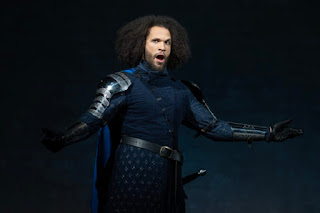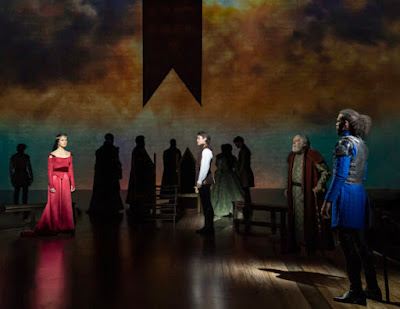Review of the evening performance on Saturday, April 22, 2023 at the Vivian Beaumont Theatre at Lincoln Center in New York City. Starring Andrew Burnap, Phillipa Soo, Jordan Donica, Dakin Matthews, Taylor Trensch, Marilee Talkington, Camden McKinnon, Anthony Michael Lopez, Fergie Philippe and Danny Wolohan. Book by Aaron Sorkin, based on the original book by Alan Jay Lerner, which is based on The Once and Future King by T.H. White. Music by Frederick Loewe. Lyrics by Alan Jay Lerner. Scenic design by Michael Yeargan. Projections by 59 Productions and Benjamin Pearcy. Costume design by Jennifer Moeller. Lighting design by Lap Chi Chu. Sound design by Marc Salzburg and Beth Lake. Choreography by Byron Easley. Direction by Bartlett Sher. 2 hours, 55 minutes, including one intermission.
Grade: C-
Camelot is the most disappointing revival of the season. So why a "C-" and not a lower grade? Well, it's because what is good about it is superb; the rest, not so much. For me, this is a show that has, in my mind, never lived up to its potential. Despite its solid, if not fully satisfying, Lerner and Loewe score, the property has always been a bit of a bore. Pageantry and mythical magic always seemed to stave off the doldrums. And so, with Aaron Sorkin on board to tweak and update the book, and revival master Bartlett Sher at the helm, my hopes were high for a thrilling new take to make me reevaluate my feelings about this classic.
Alas, I'm afraid I like Camelot even less now than before.
To start, the overall production is, to be blunt, unattractive on the verge of ugly. Designed by Michael Yeargan (sets), 59 Productions and Benjamin Pearcy (projections), and Lap Chi Chu (lighting), the cavernous Beaumont stage is severely underutilized. Large faux stone arches reach past the proscenium and suggest that castle hallways go off both sides. The floor, resembling a few lanes at a bowling alley, is there for the using, but really only facilitates a whole lot of walking around. Occasionally, the monolithic upstage wall and the sides are transformed by projections into various vague settings - lush-ish green expanses in spring, grey desolation with snow in winter, and some oddly science-like images when the villain shows up in act two. As nice as they are, they actually emphasize a lack of dimension rather than adding to it. While I wouldn't even begin to profess an understanding of how to light such a space, I found it to be largely uninspired. An occasional pool of light to denote the isolation of various areas in the castle, and an eye-opening brightness to let us know it is the lusty month of May, are about all we get - not even any interesting use of murky shadows.


Some of Jennifer Moeller's costumes are lovely - Arthur, Guenevere and Lancelot definitely get the royal treatment. Others look like cast offs from an as yet unseen Star Wars film: the knights are all dark, overly armored and shrouded with floor-length capes, reminiscent more of Darth Vader than any hero of The Round Table. Still others look embarrassingly amateurish - Renaissance Fair cosplay garb for the "simple folk." All of that is to say that visually the show looks as cold, distant and off-putting as it feels.
By and large, Sorkin has reworked this into a series of TV drama scenes where more often than not, it feels like the songs are interruptions. Not good for a musical. In his alleged effort to "update," "enrich," and "modernize" the book, he has stripped it of its heart, humor and magic (literally and figuratively). Okay, so the central trio are more relatable (?), and argue and strategize like we do. So what? You'd think he'd know how to do this without decimating what makes Camelot Camelot. To match that, Sher has blocked a series of scenes that involve a lot...a lot...of pacing, and dramatic turns, and still more pacing. You'd have thought with all of that skulking around, he'd have used more of the stage, or at least given us something more to look at. More than once, I thought to myself, "if he was only going to use the thrust, why not use the Circle in the Square?"
There were but two times in the it-feels-longer-than three hours, where the staging was actually excellent. Thrilling even. One was the tournament, that was actually colorful, exciting and wonderfully staged (fight direction by theater legend B. H. Barry). The other was the extended sequence during "Fie On Goodness!"/"I Loved You Once in Silence"/"Guenevere." The energy was palpable. It was like watching a live action movie, with cross-cutting, chases, sex scenes, arguments and treachery all weaving in and out at an alarming - and exciting - pace. The best 20 minutes of the entire production.
By far, though, the very best thing about this Camelot is its principal cast, who, to a person, mines the otherwise tedious book for every possible nugget of gold. It speaks volumes for both the production and the actors involved that the most interesting things happen in act two, when the bastard son of the King shows up to wreak havoc on the realm, and his mother lets her former lover have it, claws full out. The son, Mordred, is played by one of my favorite young actors, Taylor Trensch. His record of captivating performances remains unblemished; he pretty much single-handedly breathes life into the whole thing. His mother, Morgan Le Fey, in this version stripped of any magical powers, instead traded in for some test tubes and the idea that the Earth revolves around the sun. It is Dark STEM and Marilee Talkington (in a delightful Broadway debut) makes a meal out of the crumbs she is given.


With the central trio, we are watching a living chess game. The knight, Lancelot, is played with humorous pomposity and staggering chivalry by Jordan Donica. His "If Ever I Would Leave You" is a true highlight of the entire Broadway season. The queen, here a quagmire of conflicting loyalties and love, tempered by self-protective harshness, is astutely, if coolly, played by Phillipa Soo. She really is the full package, even if more than once one gets the sense that she is holding something back. The king, a very human, conflicted, and unsure Arthur is fully embodied by the marvelously charming Andrew Burnap. It is astonishing to watch him evolve from a youthful victim of fate/circumstance to a not-much-older but wiser (if reluctantly so) leader. By the time it is over, you'd swear he'd actually aged a few decades. All three are superb despite the material they have to work with.
The best way, unfortunately, to sum up the problems with the show comes during one of the final scenes, where both Burnap and Soo are crying passionately, and Arthur and his queen admit they have loved each other from the moment they saw each other. I was surprised. Though not the actors' fault (that is all on Sorkin and Sher), not once did I see even a glimmer of love between them.
What does it say about a Camelot where its one brief shining moment involves an illicit tryst, an evil illegitimate son and a scorned older woman?
📸: J. Marcus






No comments:
Post a Comment